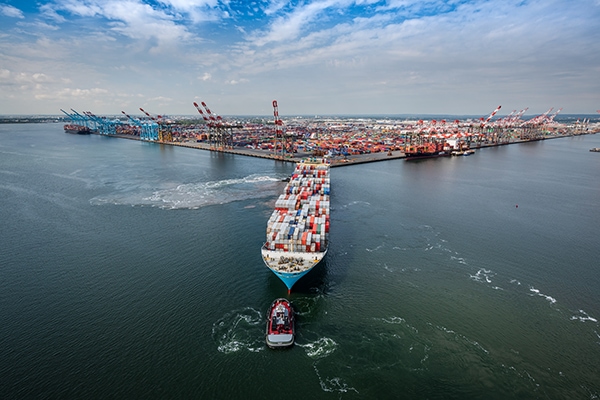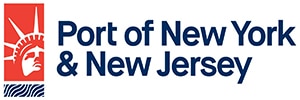Port of New York and New Jersey

Bethann Rooney
Port Director
Port Department, Port Authority of NY & NJ
The Port of New York and New Jersey is the busiest gateway on the U.S. East Coast, serving one of the world’s most concentrated consumer markets. The Port of New York and New Jersey’s network of terminals, railroads, highways, warehouses, and distribution centers gives shippers unprecedented access to the densely populated Northeast and key inland markets, reaching millions of local consumers and millions more inland quickly.
Our extensive on- and near-dock ExpressRail system—supported by two Class I railroads—has the largest lift capacity of any U.S. East Coast port and is poised to handle future growth. The Port of New York and New Jersey is focused on serving local, regional, and national markets by welcoming larger ships, accommodating increased cargo volumes, and moving cargo reliably, efficiently, and sustainably.

On-Going Improvements
Road
The Port of New York and New Jersey’s $220-million Port Street Corridor Improvement Project focuses on modernizing Port Newark’s northern roadway entrance. The redesign will create a more efficient roadway configuration, allowing for safer trucking operations to and from the Port complex.
Rail
Our extensive on- and near-dock ExpressRail system has the largest lift capacity of any U.S. East Coast port and can handle a growing discretionary cargo business with service to over 50 destinations in the Midwest, New England, and Canada.
Improvement projects such as the Southbound Connector Project will increase capacity and improve freight train movement into and out of ExpressRail Elizabeth by adding a direct southbound rail connection to Conrail’s Garden State Secondary. The additional track will allow for two-way traffic, making the rail network more efficient by reducing congestion and increasing capacity, throughput, and velocity at the Port.
Waterways
The 55-foot Harbor Deepening and Channel Improvements Project, currently in the early development phase, would deepen New York Harbor from 50 feet to 55 feet, and provide additional navigational improvements to accommodate larger commercial vessels with a capacity to carry 18,000 TEUs.
The Howland Hook Navigation Improvements Study seeks to reevaluate potential harbor deepening and navigational improvements along the Arthur Kill from the Kill van Kull to the Howland Hook Marine Terminal.
The 6-year and $180-million Wharf Rehabilitation Program will rehabilitate critical waterside infrastructure, including piles, wharf decks, and bulkheads. These repairs will keep our assets in optimal condition in order to support the vital maritime activity at the Port.
Sustainability
All of the Port of New York and New Jersey improvement initiatives are in line with the Port Authority of New York and New Jersey’s goal to achieve net zero by 2050.
The agency recently released its Roadmap to Net Zero, a comprehensive plan comprised of more than 40 actions intended to achieve both its near-term emission reduction goals and its 2050 goal of net-zero cargo emissions. The plan paves the way for the agency’s ambitious plans to work with its wide universe of tenants and contractors to achieve the 2050 goal.





